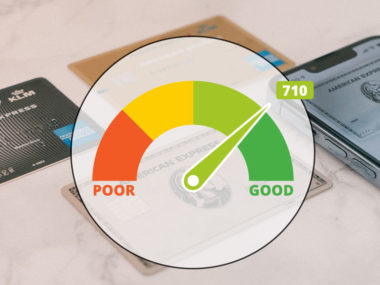If you have a credit score of 693, you have healthy credit. A score of 693 is firmly in the “Good” range of the FICO credit scoring model. The “Good” tier stretches from 670 to 739 and is followed by the “Very Good” and “Exceptional” ranges.
Having good credit is a wonderful thing. It can make your financial journey much easier and opens the doors to numerous savings and rewards opportunities. However, a score of 693, in particular, is still on the lower end of the Good range. It’s important that you take steps to help it continue to improve in the future.
Table of Contents
Why Your Credit Score Is 693
Your credit score is a graded score that is calculated based on your past financial decisions and behaviors. A credit score of 693 typically represents a mixture of some good as well as some not-so-good financial behavior.
It’s wise to consider how your score got to 693 so that you can keep it from slipping back into the “Fair” credit range (580 to 669). Below are several of the most important things that factor into your credit score. Examine each one and gauge how it may have impacted your score thus far.
Have any of these factors raised your score? Have they held it back? As you figure this out, take notes. The information will be helpful as you strategize how to improve your credit even further in the future.
Your Payment History and Total Debt
Your payment history is your track record when it comes to making payments on your debts. This accounts for roughly 35% of your entire score and is the most important thing to perform to perfection.
Your total debt is also important. This is in reference to your non-revolving credit, which is money you borrow in a single event and then pay back slowly over time.
Things like student loans and car loans are forms of non-revolving credit. If your total debt gets too high, it can lower your score, as it shows that you cannot pay back money that you already borrowed on time.
Your Credit Utilization, Mix, and Age
Your credit utilization ratio is another critical factor in the credit score game. It consists of the ratio between the money that you’ve borrowed and your available credit.
For example, if you have a home equity loan with $10,000Stick available and you’ve already borrowed $3,000, your ratio is 30%. If your credit utilization ratio gets too high on too many accounts (usually over 30%) it can come across as unstable and may lower your score.
Your credit age and mix are also important factors. The older your credit is, the higher your score will be. This considers the average age of all of your credit. So opening a new line of credit can reduce your credit age and, by extension, your credit score.
Additionally, review your credit mix. If you only have one or two forms of credit, it can restrict your score. However, if you can responsibly manage multiple forms of credit, such as an auto loan, mortgage, and credit cards, it can boost your score.
Derogatory Marks and Hard Inquiries
Your credit report could also have two items that will lower your score. These are derogatory marks and hard inquiries.
Derogatory marks come from failures to pay for borrowed money. They can be things like:
- Defaulting on a loan;
- A claim by a collection agency;
- A repossession or foreclosure;
- A debt settlement;
- Bankruptcy.
If you have a derogatory mark on your credit score, it can stay there for seven years or more. It’s wise to resolve the issue as soon as possible and then send a forgiveness letter to the original lender asking them to remove the mark.
A hard inquiry or “hard pull” takes place when a lender officially checks your credit before giving you a loan. This can temporarily lower your credit score, but only for up to a year. A hard inquiry is a common occurrence and, as long as you don’t have too many in a short time, shouldn’t cause any long-term damage to your score.
What Can You Do With a 693 Credit Score?
A score that is officially in the Good credit range opens the door to a variety of financial opportunities and benefits, such as:
- Getting lower interest rates and higher borrowing limits on a loan;
- Being approved for an apartment or getting a mortgage easier;
- Qualifying for credit cards with rewards;
- Paying smaller security deposits;
- Having greater negotiating power and the ability to refinance existing loans;
- Passing employer credit checks.
All of these are advantages you can begin to access with a score of 693. However, with your score so close to the Fair range, it’s important to continue to build toward a higher score.
How to Improve a 693 Credit Score
A credit score of 693 is nothing to scoff at. Even so, it should be treated as a healthy foundation to build on rather than an end unto itself. If you want to push your score up toward the Very Good and Exceptional ranges, you have to strategize.
With a good credit score already in your back pocket, chances are you don’t need to make any dramatic changes in your financial life, such as dealing with a foreclosure or a delinquent account. Instead, analyze your current financial habits and look for ways to improve and perfect them. Here are a few suggestions to get you started:
- Really stick to your budget and live within your means;
- Don’t take out more loans unless you have to;
- Pay down your non-revolving debt;
- Continue to utilize (and consistently pay off) your revolving credit;
- Check your credit report for derogatory marks and dispute any errors;
- Stay as healthy as possible;
- Create both short- and long-term plans for your financial future.
If you can continue to hone healthy financial habits, they will slowly help your score improve over time. This will lock you in as a beneficiary of good credit for the long haul.
Image Source: https://depositphotos.com/





